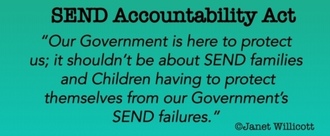-
Save Our TA'sTeaching assistance are extremely valuable staff members within schools. They have many different roles and are essential in providing support to children with increasingly varied needs. Please let's keep these vital members of staff whom our children and their teachers depend on.820 of 1,000 SignaturesCreated by Emma Felicety
-
Provide Canonbie Primary School with WiFi internetThere have been multiple unsuccessful attempts made to the local education department by the headteacher and the Parent Council to try and get WiFi for Canonbie Primary. Both Langholm Primary and Langholm Academy have WiFi access and as a partner school in a cluster with them, we believe Canonbie Primary should be treated equally and be given WiFi. We live in a digital era and for Canonbie Primary pupils to be successful they have to have digital skills. The ability to use computers and other digital equipment, use online applications, find information online, assess its quality and value, and make use of it in daily life is crucial in their education and their future as they enter the world of work. It is widely recognised that WiFi can improve the quality of education in many ways: • it enables access to a much wider range of information, knowledge and educational resources, increasing opportunities for learning in and beyond the classroom • it helps to keep lessons interesting which helps to keep pupils enthusiastic and passionate in their learning • interactive teaching methods enable teachers to tailor lessons and give more attention to individual pupils’ needs and abilities and support shared learning • it helps pupils in understanding the lessons being discussed • it helps pupils and teachers accomplish tasks faster • accessing online materials and digital technologies helps to reduce costs associated with textbooks and materials • pupils need to learn how to use the internet safely and to do everyday tasks such as online buying, internet banking and social media • pupils can develop research skills by exploring online content on their own and can immediately find the learning materials that they need while they are in school. The national curriculum and associated assessments are all changing to take account of the internet and digital technologies. The Scottish Government's Digital Learning and Teaching Strategy states that all learners should benefit fully from learning and teaching enhanced by digital technology. Reliable access to the internet is fundamental to achieving the government’s vision for the future. In addition, the Parent Council and wider community fundraised to purchase tablets to help Canonbie Primary pupils with their learning and they are not being utilised due to lack of internet provision. It is therefore not unreasonable to ask our Education Department to provide WiFi as a matter of urgency.127 of 200 SignaturesCreated by Lindsay Ward
-
Give Staffordshire University students the Adobe suite to use at home for freeThe whole Adobe suite is a crucial part of the toolkit for any creative students. Whether it be after effects or premiere Pro for media students, photoshop and light room for photography students or illustrator and indesign for graphic design students these programmes are baked into the whole creative gambit of course and the majority of students simply cannot afford to pay the monthly subscription to be able to utilise these softwares at home. I am petitioning to the higher ups at Staffordshire University to grant access to all students including ones outside of the creative courses the ability to use the aforementioned software at home. It is a small price to pay for your students education and development. By signing this petition you will be showing the bosses at the University what having this software readily avaliable 24/7 will mean to you.255 of 300 SignaturesCreated by Bryan Dowley
-
SAVE OUR BARNET NURSERIES AND SCHOOLSBarnet has already lost one nursery provider very recently due to funding cuts. Other nurseries are trying everything to stay open. There are a number of schools and nurseries which are struggling to keep their gates open due to the strain of budget cuts. It has forced many schools to make difficult decisions like cutting numbers of teaching assistants , SEND support staff, some have been forced to close early, asking parents for donations and relying on parents to volunteer in the classroom for interventions. Parents, teachers, headteachers and governors have created a grassroots campaign to organise against school and nursery cuts. Find out more by following @BarnetStop on Twitter.1,527 of 2,000 SignaturesCreated by Amy Hayes
-
Reintroduce A-Level courses to Cornwall College St. AustellWithout a nearby college that runs A-Levels, students living in Saint Austell may have to pay up to £500 to travel to further education institutions in Bodmin (30 minutes by bus) or Truro (almost 1 hour), adding a financial barrier to studying A-Levels in Cornwall. This will add another impediment to the social mobility of St Austell, a Widening Participation neighbourhood that has a low percentage of students entering higher education.78 of 100 SignaturesCreated by Philippa Uden
-
Save the Erasmus ProgrammeStudents from all over Europe can benefit by studying abroad for a year through the Erasmus Programme. For UK students this hugely beneficial programme will end in 2020 as a result of the UK leaving the European Union. The benefits of Erasmus are many, but one of the great achievements of the programme is to have brought Europeans closer together, exchanging ideas and lifestyles. British students will lose out to their European counterparts after the funding for this programme ends next year. If ever there was an action that showed how Britain is raising the drawbridge and keeping out our European neighbours this symbol of unity among people being unceremoniously dropped is a symbol of our isolation. We must let future generations benefit from this great programme and help UK students share in this fabulous programme.107 of 200 SignaturesCreated by Nick Savvides
-
Save Clarendon College NottinghamClarendon College is a Nottingham landmark and part of the fabric of society that is Nottingham and a major part of the community. Nottingham College is closing 3 of its sites and building one in the centre of town. We think the Clarendon site is worth saving. It is a safe place for students to study while not having to go to the city centre. It has adequate disabled parking for students and staff plus a nursery for the children of people who want to get back into education and who would not be able to study without it. This in turn encourages social mobility and supports our children to fulfil their potential. It is connected by tram, bus and car which is essential for some of our students and staff with disabilites. Please sign this petition to save Clarendon College, support the future of Nottiingham and give our children the opportunity to study at Clarendon.244 of 300 SignaturesCreated by Dawn Adams
-
SEND Parents to be allowed to claim financial damages against The UK's Department for Education.When the Supreme Court ruled [06 Apr 2017] ([2017] UKSC 28) [UKSC 2016/0155] IoWC v Platt - that “regularly” didn't mean “evenly spaced” or “sufficiently often” but instead “in accordance with the attendance rules” [they] agreed for the fining of UK parents, but erred in law, as [they] failed to take into account ALL children in Compulsory Education, especially SEND Children, who are continuously and REGULARLY left without Education or Schooling. "The Supreme Court unanimously allowed a Council’s appeal to fine a parent when they had removed their child a few days before the school holiday starting, on the basis that their child failed to attend 'regularly' declaring that the word ‘regularly’ means ‘by the rules prescribed by the school’. The Supreme Court failed to balance its ruling with regards to SEND Children Missing Education and Schooling, as the words “fails to attend regularly” in section 444(1)/444(1)(a) of the Education Act 1996 during term time relates to ALL Children. SEND Children are routinely and REGULARLY LEFT WITHOUT Education or Schooling because of the lack of resources, funding, and lack of school provisioning, even resorting to schools cutting their operating hours. SEND Children and Young People are also entitled to regular schooling and education under [Part 3 of the Children and Families Act 2014]. If the Government finds it acceptable to fine parents who take their children on holiday during term time, SEND Parents can claim damages against the DfE, their Local Authorities and Respective Schools for failing to educate and school their SEND Children during term. The Supreme Court failed to follow the 'rule of law' or the equal application of the law as [they] only favoured those children who were in school (mainstream) and who didn't attend 'regularly' for a short period of time. This favouring by the Supreme Court is a Direct and Indirect Discrimination under The Equality Act 2010 against SEND Children who are unlawfully forced to miss school or education REGULARLY by the lack of provision and or then having to be forced into a non-enabling environment, causing a health crisis. The Rule of Law is just that: the law applies equally to ALL. The lack of the rule of law can be because of negligence and or ignorance of the law itself. Therefore, the rule of law falls off the legislative radar because the government’s accountability factor is ineffective! The House of Commons (Petitions Committee) have twice rejected Janet Willicott's petition, taking five months to months to reply, stating, "We don't understand what 'rule of law' means, so please refer to the SEND Funding Petition instead and campaign that way..." This is NOT about SEND Funding; instead, it is about timely and early intervention and equality to include equity for ALL Children and Young People, especially disabled children and young people who are left without education and schooling for weeks, months, and years at a time. The European Court of Justice and or the European Court of Human Rights will need to be consulted on the validity of the Supreme Court's ruling, as The Education Act 1996 applies to ALL Children and Young People. I, Janet Willicott, mother, health professional and PhD student, have also been directly affected and impacted by many unlawful SEND due processes or outright negligence; I seek to implement a SEND Accountability Act to prevent further SEND Children and their families from being harmed by the UK's culture of nonfeasance, misfeasance and malfeasance. The UK is currently ranked at 179th position from 193 UN Ratified Countries for Children's Rights. The UK was ranked 11th just before the country went into political turmoil. However, regretfully, the UK is now ranked 193rd in Domain 5 (Enabling Environment for Child Rights.) Domain 5 = [Non-discrimination, Best Interests, Respect, Enabling Legislation, Budget/resources, Collection and analysis of data and State-civil society cooperation] How is it that a once mighty nation is ranked last? COUNTRY: UNITED KINGDOM (Total UN Countries 193) • Kids Rights Index ranking: 179 • Health ranking: 41-44 • Life ranking: 28 • Education ranking: 22 • Protection ranking: 35-36 • Environment ranking: 190-193 https://www.kidsrights.org/research/kidsrights-index/ https://files.kidsrights.org/wp-content/uploads/2023/06/18142918/KidsRights-Index-2023-Report.pdf Please help me ensure that ALL Children are regularly educated, schooled, and provided for in mainschool, specialist school, college, special hubs, or via s19 (Eduction Act 1996), alternative education, and EOTISC. SEND Children and Young People with Complex Health, Disabilities, Rare Diseases, ASD, Mental Health, ADHD, PANS/PANDAS, Syndromes, and Learning Needs, etc, are part of (ALL CHILDREN). Enough is enough. Children are legally entitled to education suitable to meet their needs; The UK Government must act lawfully. Thank you3,059 of 4,000 SignaturesCreated by Janet Willicott - FRSPH

-
Save Midlothian Music Tuition... AgainIf this proposal is approved, primary and secondary school children in Midlothian will lose access to tuition on a musical instrument unless they’re studying at an SQA exam level. By making this proposal, the government are saying that the only children who deserve the chance to fall in love with the music are those with wealthy enough families to pay for it. We’ve already petitioned and protested against this once - and in February, the council dropped their proposal. Now, they’re trying to push it through a second time, and we need to come together to stop them. As someone who didn't discover their love of music until secondary school, this is deeply upsetting and frustrating. For me, and countless other young people, music has had a phenomenally positive impact. It helps young people build confidence, instil passion, form friendships, and - for some - their whole life will revolve around it.1,561 of 2,000 SignaturesCreated by Jack Duffield

-
Don’t shut Disabled people out of mainstream education“Mainstream is the way, just we need more support in terms of government finance to make sure those people with disabilities are supported... If you have people with disabilities in mainstream schools able bodied people will see that from when they’re young and not find it weird to see a disabled person in their work office and not know how to approach it.“ - Joanne Wacha Our experience of education shapes our entire lives. Inclusion in mainstream society right from the start is essential if Disabled people are going to take our place in society as equal citizens. Non-disabled people need to grow up with Disabled people as friends, classmates and family members if they are to understand that we are part of society and including us is not optional. It’s so important, the UN says all Disabled people have a human right to participate in mainstream education, with children learning in the same school and classroom. But right now government funding cuts mean for many Disabled pupils, including those with special educational needs, attending their local schools has been made impossible. Funding for the support Disabled children need to participate equally, such as one to one support, therapists and specialist equipment, has been hard hit by cuts. More and more Disabled pupils have found themselves shut out from mainstream schools, even pushed out of the education system altogether. If you want to live in a society which values difference, where Disabled people are included as equal citizens, please join our call to make sure inclusive education gets the funding it desperately needs. You can find out more about the campaign here: https://www.allfie.org.uk/campaigns/educate-dont-segregate/109,708 of 200,000 SignaturesCreated by Alliance for Inclusive Education (ALLFIE)
-
clamp down on disability discrimination in London South Bank UniversityWe are a group of disabled students, who are taking legal action against their university over claims of disability discrimination. Venesha Rose has dyslexia, dyspraxia, cognitive delays, blind in the right eye, and has complex mobility. Penny Heinz has complex mobility and learning disabilities and is a care leaver who has had no education from the age of 10 years old. Natasha Gentles has dyslexia and mental ill health and suffers from anxiety and panic attacks. We have also launched a petition, which has already been signed by hundreds of supporters. The claims we have brought are focused on the failure of London South Bank University to provide the support needed by students with learning difficulties such as dyslexia, dyspraxia, blindness. Moreover, there is not any coordination between the independent provider and university lecturers working together, which disadvantages the student as their one to one provider may not be within their discipline, thus have no knowledge of the field. This makes it impossible for them to provide comprehensive support that is needed for a disabled student.249 of 300 SignaturesCreated by Venesha Rose

-
Stop cuts to Derby’s Specialist Teaching ServiceDerby City Council are planning a £220,000 cut in its specialist teaching service, which will almost exclusively affect its support for autistic children. At a time when autistic children are finding support difficult to come by, this is a massive blow to their education and their families, who are left to pick up the pieces. This cut represents a 25% loss in capacity, and must be stopped. We know that autistic children are three times more likely to be excluded than children without special needs. We know that school can be overwhelming and teaching staff often rely on training so that autistic pupils can flourish in their classrooms. The Government recognises that more needs to be done to support autistic children, in the classroom and out, and is including children and young people in their national autism strategy, released in November 2019. Instead of listening with open ears to what needs to change, Derby City Council are instead cutting jobs. Show Derby City Council that they must not make these cuts, and they must act to ensure they create an education system that works for autistic children and families.2,623 of 3,000 SignaturesCreated by George Stanbury
Hello! We use cookies to improve your experience by providing insights into how the site is being used. Find out more.

.jpg20191009-1743-1jjl3q5.jpg)









.png)
